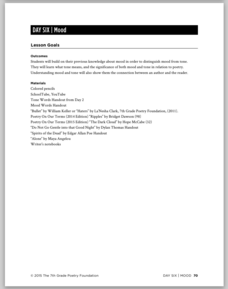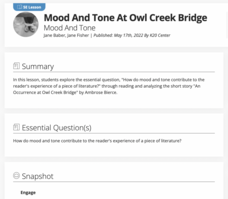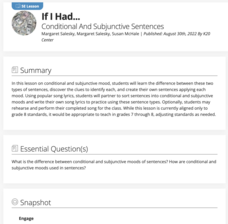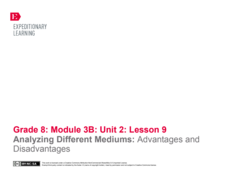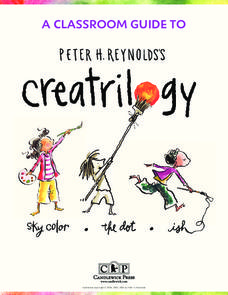Curated OER
The Present Subjunctive: How?
Once your class has mastered the indicative, it's time to present the subjunctive mood. This resource focuses solely on how to conjugate in the present subjunctive, but does link to more information on how to to use it. Class members can...
Curated OER
Other Tenses in the Subjunctive Mood
After your class has mastered the present and past subjunctive, allow them to explore additional tenses in the subjunctive mood. The resource covers how to conjugate the present perfect, pluperfect, and future subjunctive. Practice is...
Curated OER
Literary Mood Ring
Get some giggles from your class and build understanding of the mood of a literary piece with this printable. Pupils fill in the mood in the gem part of the ring, and write down supporting details below (inside of the actual ring). While...
Curated OER
Mood
Young scholars learn how to distinguish between the mood of a piece of writing (how the work makes the reader feel) and the tone (the writer's attitude toward the material) in the sixth instructional activity in a poetry unit. After...
Lafayette Parrish School System
Teaching Tone and Mood
Tone and Mood are not synonymous! Introduce young readers to these literary devices with a series of exercises that not only point out the significant differences between the terms but also shows them how to identify both the tone and...
K20 LEARN
Mood and Tone at Owl Creek Bridge: Mood and Tone
Two versions of movie trailers for the film Mary Poppins launch a supercalifragilisticexpialidocious lesson about how mood and tone impact a reader's experience of work. Using the provided list, readers identify the words that create the...
K20 LEARN
If I Had... Conditional and Subjunctive Sentences
Lines from popular songs are used to teach middle schoolers about conditional and subjunctive moods. Groups engage in a card sort activity to identify conditional and subjective sentences and then partners draft sentences of each type....
Curated OER
Spanish Commands (the Imperative Mood)
It is imperative that your pupils have a strong command of all the Spanish moods, including the one that is the focus of this resource. Learners can read up on formal, informal, affirmative, and negative commands as well as how to use...
EngageNY
Analyzing Author’s Craft: Analyzing Hillenbrand’s Language Techniques
Young readers take a look at the conditional and subjunctive moods authors use. The Conditional and Subjunctive Mood handout defines the types of moods and gives them examples and practice. They then work with partners to identify...
Deer Valley Unified School District
Close Reading: Analyzing Mood and Tone
The AP Literature and Composition exam is all about close reading. Test takers are presented with a passage and asked to analyze how an author uses literary devices to create a desired effect. Prepare your students for the exam with a...
Office of Migrant Education
Poetry: Form, Syllables, Mood, and Tone
Looking for a resource to introduce homeschoolers and other out-of-class learners to the elements of poetry? Check out this packet that defines and illustrates important poetry terms.
Curated OER
Perfect Tenses
As you explore the perfect tenses, direct your class to this resource, which provides explanation and examples for reference as well as an online interactive exercise for practice. They can first read up on haber and either continue...
EngageNY
Analyzing Different Mediums: Advantages and Disadvantages
How do authors play to people's moods? After briefly reviewing mood using a Conditional and Subjunctive Mood handout, learners practice identifying conditional and subjunctive sentences in the Montgomery Bus Boycott speech before reading...
Macmillan Education
Understanding Poetry (Elementary)
Introduce young readers to poetry analysis with a instructional activity that uses Emily Bronte's "Spellbound" to model how poets use word choice, the sounds of words, the repetition of words, and rhyming patterns to create the...
Read Works
City Autumn
Glimpse a beautiful moment through poetry with a reading comprehension activity. As sixth graders read through "City Autumn" by Joseph Moncure March, they answer ten questions about the setting, mood, vocabulary, and punctuation of...
Candlewick Press
A Classroom Guide to Peter H. Reynolds's Creatrilogy
Help young readers find, identify, and use their voices with a set of empowering activities based on Peter H. Reynolds' trilogy of books. Sky Color, Ish, and The Dot focus on recognizing moods and treating each other...
EngageNY
Grade 10 ELA Module 4: Unit 2, Lesson 5
When Macbeth says, "Nature seems dead," he uses personification. Using the resource, scholars complete a Quick Write to analyze the impact of figurative language on the mood of Shakespeare's Macbeth. Pupils also participate in an...
EngageNY
End of Unit Assessment: Analysis of Language Techniques
Watch your language! Scholars work on an end-of-unit assessment in which they demonstrate the language skills they learned. Questions ask readers to work with different types of verbs and moods all about the text in Unbroken.
Nasher Museum of Art at Duke University
Are You My Mother? An Opinion Writing Unit
During a five-day lesson, scholars analyze written and visual art—primarily the poem, Mother to Son by Langston Hughes— identify facts, and write opinions. Learners read the poem several times, discuss, write, compare and...
EngageNY
Jigsaw to Analyze Mood and Tone in To Kill a Mockingbird (Chapter 8)
We have an appointment! Scholars meet with another discussion appointment to discuss the text structure of the poem "Incident" by Countee Cullen. They use a Note Catcher to guide their thinking and compare the structure to chapter 8 of...
Elementary School Counseling
The Day Jace Kelly Popped
Anger can creep inside and build up in all of us. Prepare your youngsters for this feeling by reading the story of Jace Kelly through this series of storytelling printables, and discover the strategies he would eventually...
Huntington Library
Light in Painting
How do painters use and manipulate light in their artwork to give emphasis and establish mood and emotion? Pupils will analyze a few examples of landscape and portrait painting in order to explore the how light is used in art,...
The New York Times
Collateral Damage? Researching a Connection Between Video Games and Violence
Hook your class into an exploration of and discussion about violence in video games with a cute animal clip and a video game trailer. After a quick discussion about how media can affect mood, class members read a related article and...
Night of Mystery
Pirate Words and Phrases
Avast, ye mateys! A full dictionary of pirate phrases and words is sure to get your little pirates in a mood for sailing, reading, or writing. It features a basic list of terms as well as a more extensive dictionary for your class to be...



